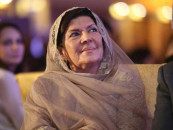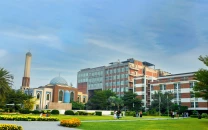NA passes controversial transgender persons' bill
Rejects JUI-F’s suggestion to refer it to standing committee

NA passes controversial transgender persons’ bill. PHOTO: AFP/FILE
Prior to the voting on the bill, which aims to ‘provide for protection, relief and rehabilitation of rights of the transgender persons’, MNA Naeema Kishwer of Jamiat Ulama-e-Islam (JUI-F) said there are some serious flaws in the bill that need to be rectified.
She suggested that the bill should be referred to the standing committee for detailed review and deliberation. She also moved a motion and amendments to refer the bill to Council of Islamic Ideology (CII) and the standing committee but these suggestions were rejected.
Talking to The Express Tribune, Kishwer said the bill has several serious flaws which were needed to be addressed before its passage. “But it seems the government is in a hurry and is more concerned about passing as many bills as it can during its tenure.”
She said one of the major shortcomings is that the bill allows ‘castration’ which is against Islam. “It means that any normal person after undergoing a surgery can become a transgender person; however in our religion it is strictly prohibited,” she said.
Transgender community finds a hero in Marvia Malik
She also suggested establishing a medical board to determine whether or not a person is a real transgender person. She also expressed reservation over the definition of transgender person in the bill.
Nadeem Kashish, president of the She-male Association for Fundamental Rights (Saffar) is of the view that after the adoption of bill a normal person can easily change his or her gender to become a transgender person or to join the transgender community which is prohibited in Islam.
“Now the government should establish a designated clinic in every public hospital where a surgeon should be appointed to carry out castration of such people who want to change their gender to become a transgender person as now it has become legal in Pakistan after the passage of this bill,” said Kashish.
Kashish urged the Chief Justice of Pakistan (CJP) Mian Saqib Nisar to take suo motu on legalising castration in Pakistan through this bill which is against Islam. “The CJP should tell that castration is legal or illegal in Pakistan,” asked Kashish.
Earlier in February the Human Rights Watch (HRW) and later the CII also expressed their reservation over the definition of transgender person in the bill.
A letter written by HRW Asia Division Executive Director Brad Adams — a copy of which is available with The Express Tribune — highlighted serious flaws in the definition of a transgender person and intersex person and also suggested to rename the draft bill.
Transgender subjected to 'torture' in Peshawar
The letter was written soon after it was passed by the Senate’s Functional Committee on Human Rights in February this year. The organisation also urged Pakistan to rectify these flaws at the earliest.
Later the CII also expressed reservation over definition of transgender person and recommended to rectify it. But the suggestions given by both HRW and CII were mostly ignored.
“I truly believe that 70% of the CII’s suggestions have been adopted in the bill passed by the NA. However, the CIl will recommend the federal government to rectify the remaining flaws so that the bill would fully serve the purpose it has been passed for,” said CII Chairman Dr Qibla Ayaz..
Qamar Naseem, one of the members of a national taskforce constituted by the federal government for drafting the bill, said there are various flaws in the bill.
“In the bill it is written that ‘it extends to the whole of Pakistan’ but below in the definition it is written that ‘government’ means the ‘federal government’. How is it possible after 18th amendment to implement the bill in provinces as well?” he asked.



















COMMENTS
Comments are moderated and generally will be posted if they are on-topic and not abusive.
For more information, please see our Comments FAQ